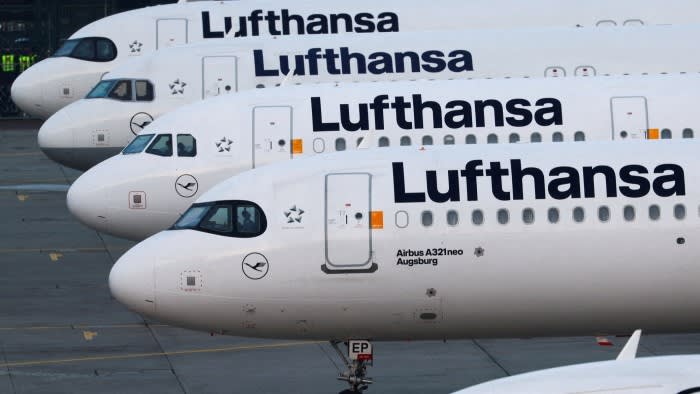Unlock the Editor’s Digest for free
Roula Khalaf, Editor of the FT, selects her favourite stories in this weekly newsletter.
Hands up: when buying an airline ticket, do you choose to pay extra to offset carbon emissions? If the answer is “no”, you are not alone. Percentage uptake of voluntary offset schemes can be in the low single digits.
Instead, Lufthansa has introduced a compulsory “environmental cost surcharge” on flights from an EU country, the UK, Norway or Switzerland from the start of 2025. This will add as much as €72 to a first class long-haul ticket. On short- to medium-haul flights it will be closer to €1-€7. The German airline is unlikely to travel alone. Expect mandatory green surcharges to pick up among legacy carriers in particular.
A host of environmental regulations are to blame, says Lufthansa. It cites EU requirements for airline fuel to include a blend of at least 2 per cent Sustainable Aviation Fuel (SAF) from next year, plus changes to emissions trading schemes (ETS) in Europe. Air France-KLM laid the groundwork in 2022 by imposing a “SAF contribution charge”, levied at a lower level.
Each regulatory change on its own isn’t extortionate. Admittedly SAF, produced from a variety of materials including recycled cooking oil, should cost at least twice the long-run historical price of kerosene up to 2050, according to a recent report by LEK Consulting.
But assume Lufthansa’s fuel bill in 2025 remains close to the €8.3bn it forecasts for 2024, a back of the envelope calculation this suggests compliance with 2025 EU blending rules might cost an extra €17mn. Required blending levels increase again in 2030 and 2035.
Changes to the EU’s ETS scheme and similar programmes elsewhere will be more costly. Currently, polluters receive some free allowances but these are being reduced. The impact on legacy airlines will be bigger, argues Goodbody analyst Dudley Shanley, as they were historically bigger emitters and tend to have less efficient fleets.
This year Lufthansa is expecting to receive free emissions certificates for some 2.8mn tonnes of CO₂, versus 3.8mn tonnes in 2023, according to its last annual report. That reduction could cost €65mn, assuming BloombergNEF’s forecast for an average EU emission allowances price of €65/t this year. These are expected to rise to €80/t in 2025.
In good times, such costs could be absorbed. Lufthansa should produce a net profit in 2025 of nearly €1.8bn on Visible Alpha numbers.
Yet legacy airlines fight a perpetual war to close the significant cost gap on their budget rivals. Passengers may grumble but the baggage of mandatory environmental levies — at least among the flag carriers — could well become the norm.
nathalie.thomas@ft.com


